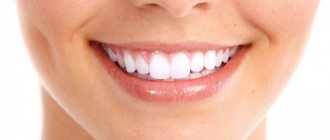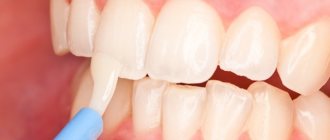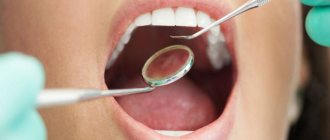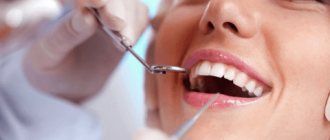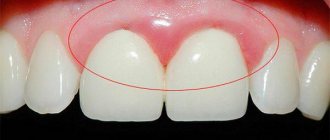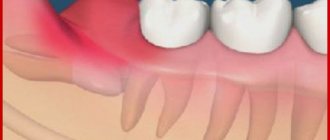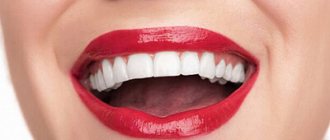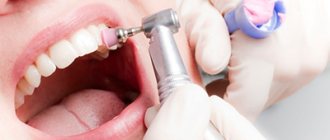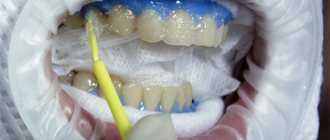Consultation with a doctor When it comes to the oral cavity, the expression “you are what you eat” becomes truly meaningful. Sweet foods such as sugar, candy, and carbonated drinks lead to the destruction of tooth enamel. Other foods, such as dairy products or vegetables, on the other hand, help fight plaque buildup and act like a natural toothbrush, delaying dental treatment for longer.
So, what foods promote dental health?
The influence of nutrition on dental health
To maintain oral health, a number of microelements are required - calcium, fluoride and phosphorus. A person gets them from food. If the diet contains few healthy and micronutrient-rich foods, the enamel weakens and is more difficult to restore.
Dental plaque is a thin, invisible film on the teeth that maintains the health and microflora of the mouth. When a person eats sugary or starchy foods, it reacts with plaque to form acids. These acids attack the enamel, destroying it.
Consuming sugar in small quantities will not lead to tooth decay or inflammatory diseases. But if harmful foods are constantly in the diet, then undesirable consequences will certainly arise, and treatment of caries cannot be avoided.
Excess sugar and lack of calcium and phosphorus leads to caries and inflammatory diseases of the oral cavity.
Rules
Dentist recommendations for maintaining a beautiful and healthy smile:
- Drink more water;
- Eat fresh fruits, berries, greens, which are the main source of vitamins and minerals;
- Fresh nuts and seeds;
- Algae that contain amino acids and iodine;
- Herbal teas, chicory;
- Never chew foods and objects that are not intended for this with your teeth;
- Brush your teeth at least twice a day.
Get a preventive examination every six months at Olis-Dent dentistry to promptly detect and prevent the occurrence of dental diseases.
Products that are harmful
What is good for your teeth is good for your entire body. Poor nutrition causes physical and psychological problems. Oral diseases lead to a decrease in overall immunity. And with pain or active inflammation, it will be difficult to eat and communicate.
So, harmful foods for teeth are:
- Sweets. This includes chocolate, cakes, cookies, candies. The sugar contained in these products settles on the enamel and subsequently destroys it. Also, crowns and fillings placed on teeth wear out faster. The worst are those sweets that are difficult to clean out of the mouth, like candy or caramel. Small pieces of caramel get stuck between teeth. This is significantly worse than, for example, chocolate, which easily washes out when brushing or rinsing.
- Soft drinks. Store-bought soda and iced tea contain equal amounts of harmful sugars, which erode tooth enamel and lead to tooth decay. It is better to give up such drinks and switch to water or unsweetened loose leaf tea. If it is difficult to give up carbonated sweet drinks, then after each use you should rinse your mouth with warm water.
- Hard and starchy foods. These are crackers, chips, popcorn, nuts and dried fruits. They not only get stuck between the teeth, but also scratch the enamel and gums. Scratches turn into small cracks. Food will get stuck there, which will lead to inflammatory processes.
- Sour. Citrus fruits and juices from them, lemon and berries - all this harms teeth. High acid content is harmful to oral health. It is worth limiting the consumption of foods with high acidity. It is advisable to drink juices through a straw - contact with the enamel will be significantly reduced, along with the risk of undesirable consequences.
- Coloring products. Black currants and chokeberries strongly stain tooth enamel. But these berries also contain vitamins that are good for teeth. So you can eat them, but you shouldn’t overuse them. The second product is coffee. It is not only capable of staining the enamel dark, but also leaching calcium from the enamel. Therefore, it is better to reduce coffee to 1 cup per day or, if possible, completely abandon it. Professional teeth whitening will give longer lasting results if you follow a “white” diet.
Top 3 most harmful sweets for teeth:
- Taffy. And not only toffees, but also all sticky and viscous sweets: chewing candies, toffees, soft sticky caramel. Such candies are the most dangerous for teeth for one simple reason: they stick to teeth and get clogged in the interdental spaces, and then destroy the enamel over time. A piece of toffee stuck to your teeth, which you don’t even feel, will slowly dissolve and be “eaten” in the evening at best, and maybe it won’t leave you even after brushing your teeth if you are not careful enough. 2. Caramel. Caramel contains a record amount of sugar, often softens when consumed and, like toffee, sticks to the teeth in hard-to-reach places. In addition, it takes a decent amount of time to eat caramel - and all this time your teeth are left to be torn apart by destructive bacteria and acids.
- Lollipops. In terms of their effect on teeth, lollipops are similar to caramel, but they have another unpleasant property: they are very hard, therefore, when they hit the teeth, they can leave microcracks in the enamel. And microcracks, as we know, not only increase the likelihood of developing caries in the future, but also reduce the strength of teeth, making them more fragile and vulnerable to injury, chips, etc.
A separate conversation is about the effect of dried fruits and fruits on teeth. On the one hand, these products are healthy and are an excellent substitute for sweets, but there are several “buts” in this idyll:
- Dried fruits containing high concentrations of fructose, that is, natural sugar (which can harm teeth no worse than refined sugar), should be eaten wisely. Very sweet raisins, for example, are viscous in the pulp and, like toffees, can stick to the teeth and get clogged in the interdental spaces. And candied fruits (dried pineapple, papaya, kiwi, etc.) generally contain refined sugar and are no different from ordinary sweets and other sweets in terms of their effect on teeth.
- Some acidic fruits - especially citrus fruits - contribute to the destruction of enamel due to their high content of fruit acids. This is why dentists do not recommend digging your teeth into oranges and lemons: when eating citrus fruits, you need to minimize the contact of the fruit with tooth enamel, and when drinking citrus juices you should use a straw. By the way, acid is also often found in fruit-flavored candies, which is why candies can be considered doubly harmful.
Products good for teeth
- Dairy products. Milk, yogurt, cheeses and cottage cheese are the main products that strengthen teeth. They are rich in microelements necessary for enamel - phosphorus, calcium and fluorine. As well as the protein casein, which is involved in the formation of protective plaque. Dairy products also contain vitamin D, which helps calcium be absorbed properly. The main thing is to choose dairy products without sugar or sweet additives.
- Greenery. Leafy greens are always at the top of the list for healthy foods. It is full of vitamins and microelements that are so necessary for the body and, in particular, teeth. Calcium, folic acid, B vitamins strengthen enamel and reduce inflammatory processes, which can prevent rapid gum treatment.
- Hard vegetables and fruits. Apples, pears, carrots, celery and cucumbers contain a full range of vitamins and minerals. This helps to form the correct microflora in the oral cavity and strengthen teeth. The fibrous, hard structure of fruits and vegetables works like a toothbrush - a natural massage of the gums and a complete cleansing of the oral cavity.
- Water and weak teas. Water helps get rid of food particles between the teeth and rinses the mouth. This not only prevents inflammation, but also eliminates bad breath. Tea - green, white or weak black - also has a positive effect on the condition of the enamel. Green tea contains fluoride, which is essential for teeth.
- Seafood. It is known that fish and other seafood are the main source of omega-3, phosphorus, calcium and fluoride. All these microelements are necessary, so eating fish will definitely improve the condition of the oral cavity.
Each product affects not only the general condition, but also the health of the oral cavity. It is important to maintain a healthy balance in your diet, focusing on healthy foods and reducing harmful ones to a minimum.
After eating unhealthy food, you should rinse your mouth with water to minimize the negative effects.
The main thing is not to forget to brush your teeth twice a day and use special floss.
Professional oral cleaning will help you maintain a beautiful and healthy smile. The doctor's consultation
Dental care if teeth begin to crumble.
The dentist will select the appropriate method for restoring the integrity and natural appearance of the tooth. The choice largely depends on the degree of its defeat.
Mineralization
A strengthening procedure during which applications containing calcium and fluoride are applied to damaged teeth.
Fluoride coating of teeth
The procedure also strengthens the enamel, but special fluoride-containing pastes are used.
Sealing
If a tooth is slightly crumbled, it can be restored using filling material.
Veneers
Used if the front tooth has crumbled. Ceramic onlays will perfectly restore the beauty of your smile.
Tabs
When the chewing tooth is destroyed by 50%, reliable inlays are saved. They are more durable and airtight than fillings.
Crowns
If the tooth is left with virtually no crown part, prosthetics should be performed with ceramic crowns - excellent for front teeth, and zirconium - for chewing teeth.
Removal followed by implantation
When a tooth has crumbled and only the destroyed root remains, it must be removed and, if possible, an implant and crown should be immediately installed on it.
Don't like teeth
- sticky sweets that stick to the teeth and spoil not only healthy, but also cured teeth;
- Sugar-rich foods - when combined with saliva, they release harmful acids that contribute to the destruction of tooth enamel. If you have a sweet tooth, eat sugary foods infrequently and try to brush your teeth immediately after such a dessert meal;
- liver and chips - due to slow dissolution in the mouth, such products have an even more negative effect on the enamel and provoke dental caries and other dental problems;
- neglect of hard and rough foods - constant eating of foods and dishes of a soft consistency provokes the formation of tartar and, as a result, other enamel lesions;
- sudden changes in temperature - do not wash down ice cream with hot coffee, or boiling broth with ice water. Due to sudden changes in temperature, enamel becomes brittle and susceptible to damage.
- nuts in shell - do not chew nuts and other hard objects with your teeth; for this there are special tongs, scissors and other tools that are not dangerous for dental treatment;
- bananas and raisins - these products adversely affect the microflora in the oral cavity, so do not overuse them or rinse your mouth after meals;
- smoking – tobacco spoils the color of teeth and reduces immunity, which leads to more frequent diseases of the oral cavity and the whole body;
- citric acid in drinks and food;
- cleaning with third-party devices – contact of teeth with metal products, especially not sterile ones, is contraindicated. Therefore, stop removing food debris from your teeth with a needle and other improvised objects - buy normal toothpicks or dental floss for safe oral hygiene;
- Teeth whitening – this procedure not only improves the color of the enamel, but also injures it. Therefore, it is not recommended to undergo this procedure more than once every six months;
- lack of fluoride and calcium - with a lack of these microelements, the condition of the teeth seriously worsens. Calcium can be bought at the pharmacy in the form of tablets and taken independently, while fluoridation of teeth and the use of fluoride paste are prescribed by a doctor.
What harms our teeth?
So, we need to start by understanding that daily brushing of teeth is only part of caries prevention, although it is the most important part of oral care. An equally important role is played by what we eat, and every day, since in some cases brushing our teeth in the morning and evening (2 times a day) may not be enough to eliminate the risk of caries. The fact is that the worst enemy of our teeth are acids contained not only in food, but also in numerous sweet drinks. Moreover, some food that gets stuck between teeth can produce these acids, which are very harmful to tooth enamel, damaging it and opening up access to pathogens.
Accordingly, the most valuable and useful products specifically for teeth are those that can neutralize the effects of acids, as well as those containing trace elements, alkali and vitamins. This must be taken into account when preparing your daily diet, as this will protect your teeth from harmful effects, keeping them healthy and strong for a very long time.
